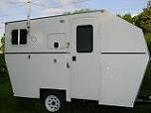Reminder
23 posts
• Page 2 of 2 • 1, 2
Re: Reminder
I agree, a GPS receiver is a good thing to carry. Be sure to have spare batteries. However, depending on the terrain or tree cover, it is sometimes very hard to lock onto the minimum number of satellites required.
viewtopic.php?f=50&t=50642 Build journal
-

mustangcats - Silver Donating Member
- Posts: 233
- Images: 18
- Joined: Sun Apr 08, 2012 3:35 pm
- Location: Iowa
Re: Reminder
Another vote for GPS. I use one daily to get me to in-home service calls.
I took it on a trip to Alaska a couple of years ago and carried it around while walking in towns, to find my way back from where we started. Just set a "favorite" at origin and "go to favorite" when it was time to head back. It also came in handy to find restaurants and services outside the normal tourist trap places.
I took it on a trip to Alaska a couple of years ago and carried it around while walking in towns, to find my way back from where we started. Just set a "favorite" at origin and "go to favorite" when it was time to head back. It also came in handy to find restaurants and services outside the normal tourist trap places.
Vedette wrote:GPS!
Yes, we are in a the days of modern technology.
Using a GPS makes using a map almost un necessary. Unless you like to look at the big picture.
Good Roads
Brian & Sandi
- VijayGupta
- Teardrop Master
- Posts: 200
- Joined: Sun Jun 10, 2012 11:26 am


 I remember buying head lamps one day. The sales man was adamant the one that was powered by AAA batteries was the best one to get. I simply told him, all the rest of the electronic devices I carry when hiking use AA batteries, why would I want to carry yet another spare battery type. Furthermore, AA batteries are ubiquitous. They are everywhere in the USA. It worries me with many devices going to built in non replaceable batteries. It means you have to have some way to recharge them if you want to use them for longer then their battery life. Looks like USB cable recharge is the wave of the future. Even my little toy helicopter uses it.
I remember buying head lamps one day. The sales man was adamant the one that was powered by AAA batteries was the best one to get. I simply told him, all the rest of the electronic devices I carry when hiking use AA batteries, why would I want to carry yet another spare battery type. Furthermore, AA batteries are ubiquitous. They are everywhere in the USA. It worries me with many devices going to built in non replaceable batteries. It means you have to have some way to recharge them if you want to use them for longer then their battery life. Looks like USB cable recharge is the wave of the future. Even my little toy helicopter uses it.